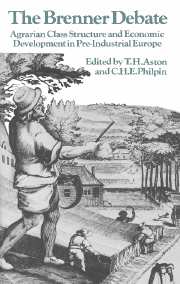Book contents
- Frontmatter
- Contents
- Preface
- Introduction
- 1 Agrarian Class Structure and Economic Development in Pre-Industrial Europe
- 2 Population and Class Relations in Feudal Society
- 3 Agrarian Class Structure and the Development of Capitalism: France and England Compared
- 4 Peasant Organization and Class Conflict in Eastern and Western Germany
- 5 A Reply to Robert Brenner
- 6 Against the Neo-Malthusian Orthodoxy
- 7 A Crisis of Feudalism
- 8 In Search of Agrarian Capitalism
- 9 Agrarian Class Structure and Economic Development in Pre-Industrial Bohemia
- 10 The Agrarian Roots of European Capitalism
- Index
- Past and Present Publications
3 - Agrarian Class Structure and the Development of Capitalism: France and England Compared
Published online by Cambridge University Press: 27 October 2009
- Frontmatter
- Contents
- Preface
- Introduction
- 1 Agrarian Class Structure and Economic Development in Pre-Industrial Europe
- 2 Population and Class Relations in Feudal Society
- 3 Agrarian Class Structure and the Development of Capitalism: France and England Compared
- 4 Peasant Organization and Class Conflict in Eastern and Western Germany
- 5 A Reply to Robert Brenner
- 6 Against the Neo-Malthusian Orthodoxy
- 7 A Crisis of Feudalism
- 8 In Search of Agrarian Capitalism
- 9 Agrarian Class Structure and Economic Development in Pre-Industrial Bohemia
- 10 The Agrarian Roots of European Capitalism
- Index
- Past and Present Publications
Summary
Robert Brenner's exposure of the weakness of traditional explanations for the pattern of economic development in late medieval and early modern Europe is welcome and effective. His insistence on the necessity to examine in comparative fashion the class structures of different European countries is also to be applauded. But in the process of making a number of important observations he so telescopes long-term economic trends that crucial stages in them are obscured, and his explanation for the contrasting developments in England and France in particular is open to serious doubt.
The core of his argument is that it was the failure of the English peasant to establish secure property rights which made possible the concentration of estates in the hands of capitalist landlords who leased them to capitalist tenant farmers, whereas in France the success of the French peasantry in establishing complete freedom was an insuperable barrier to economic progress. Both halves of this argument are suspect. As far as England is concerned, it is based on generalization and a reading “backwards” of economic history from the end of the seventeenth century; as far as France is concerned, the position of the peasantry is misunderstood.
Brenner has succumbed to the general unwillingness to believe that agricultural development could take place anywhere except on large farms which made large-scale capital investment possible and profitable. Any examination of the development of capitalist farming from the point of view of “large, consolidated holdings farmed on the basis of capital improvement with wage labour”, besides referring more to eighteenth-century developments, must necessarily concentrate on large landlords.
- Type
- Chapter
- Information
- The Brenner DebateAgrarian Class Structure and Economic Development in Pre-industrial Europe, pp. 79 - 90Publisher: Cambridge University PressPrint publication year: 1985
- 3
- Cited by



